Like father like son
I ended up at COP Spera for longer than I had anticipated. On arrival, Lieutenant Corcorain, explained that they had only been told to expect me hours ahead of time and when I replied “don’t worry, I’m only here over night” he shot straight back “I wouldn’t bet on it, that’s what the last reporter thought and he was here over a week.” Sure enough, I was there nearly a week.
While checking in with the lieutenant one morning to find out if he had any patrols planned, one of his men reported that an old Afghan man had turned up at the gate with a bloody head, looking for medical assistance. To be honest, it didn’t sound particularly interesting but with no patrol on offer I decided to tag along in any case. The plot, however, was about to thicken.
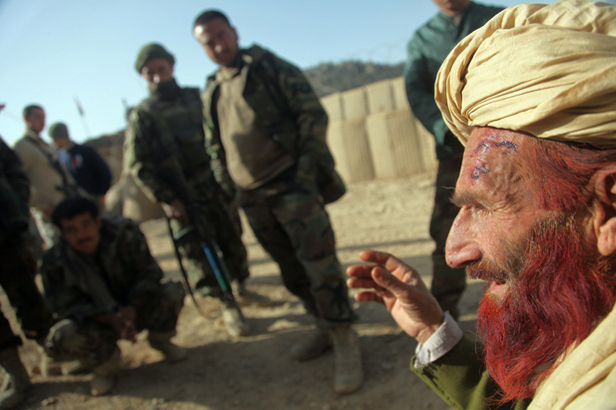
As the old man began to explain what had happened, my first thoughts were to question whether he had any idea of the severity of his claims. By his account he had argued with his son who had been high on marijuana and was intent on joining the Taliban to become a suicide bomber. With the help of some of his fellow villagers he had restrained and chained his son up, who later managed to escape and beat his father in revenge.
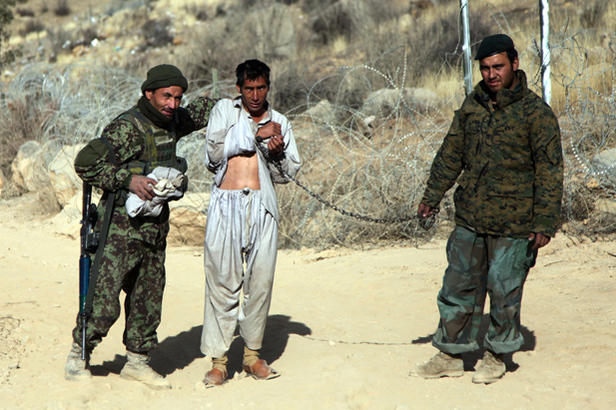
Realising that the son was also present, the lieutenant called him over for questioning. As the Afghan soldiers led the son towards us, the trust issues between them and the US soldiers flared to the surface as the Americans demanded that the Afghans raised the man’s shirt in clear view of them. The Afghans for their part insisted they had already searched him. One of them clearly felt humiliated and lost his temper, blurting a string of crude expletives at the US soldiers in broken English. The Afghans eventually relented but not before a fierce exchange of threats and insults.
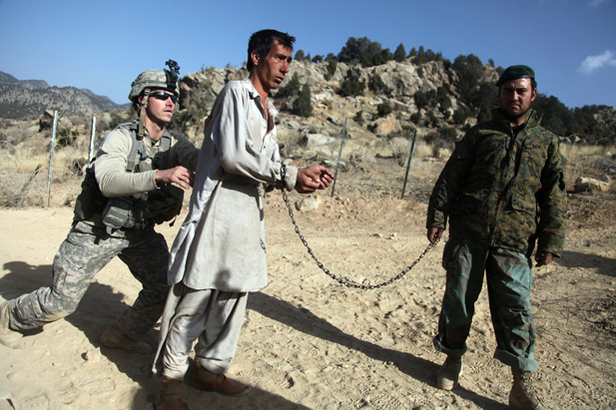
It quickly became apparent that the son had an entirely different story, claiming that it was his father who had taken him to the Taliban. He did confess an argument took place during which his father was pushed to the ground thereby hitting his head, which was concurrent with the wound. He proceeded to supply the names of men he claimed were Taliban members who had chained him up and sent him home when he refused to carry out a suicide attack.
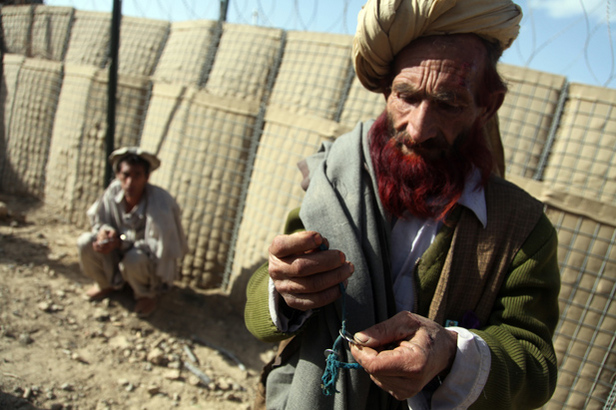 [The Father holds up the keys to his son’s shackles]
[The Father holds up the keys to his son’s shackles]
At any rate he made no attempt to hide the fact that he smoked marijuana and had been jailed twice because of this in Miran Shah on the Pakistan side of the border. This prompted the Lieutenant to ask whether he was stoned when the Taliban asked him to carry out a suicide attack, to which he replied he was and continued to explain how they had told him he would go to paradise, which, they said, “was surely a better option than jail.” He claimed it wasn’t the first time they had asked him to become a suicide bomber and that he had always refused. When asked what his occupation is, he simply replied “I just find hashish and smoke it!”
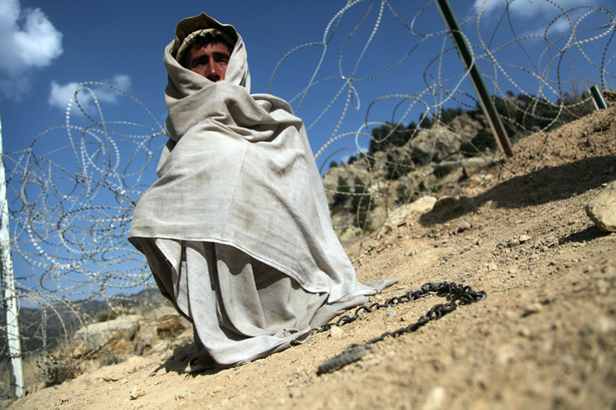
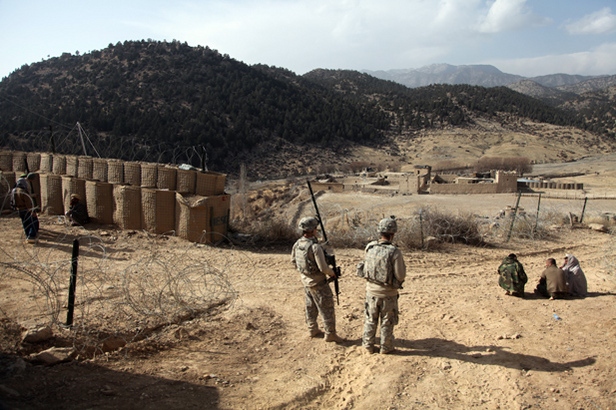
[The father (crouching on the far left) and son (on the far right) being questioned. In the background is the Afghan National Army base]
As if not satisfied with the depth of the hole he was digging, the son said that he used to deliver hashish to an Afghan soldier at Spera, named Kaku, whom the other Afghans denied any knowledge of.
The lieutenant succinctly concluded “one of them is full of shit!” and he was spot on; scarcely a single element of their stories matched. As the soldiers questioned the pair further, they proceeded to disagree on how many other sons there were, what they did and how old they were.
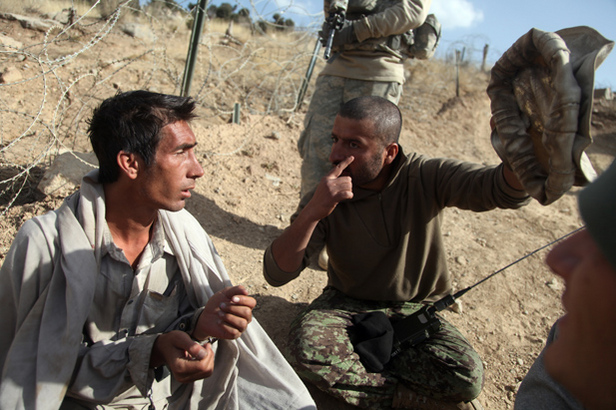 [An Afghan soldier explains to the son that he should look directly into the camera to have his iris photographed]
[An Afghan soldier explains to the son that he should look directly into the camera to have his iris photographed]
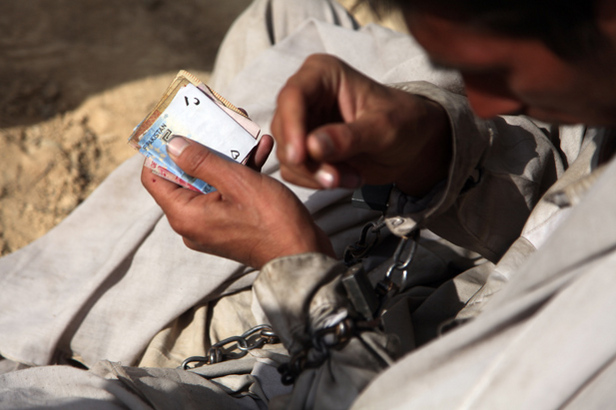 [The son with a wad of Pakistani money – the common currency in this part of Afghanistan]
[The son with a wad of Pakistani money – the common currency in this part of Afghanistan]
When the questioning was finished the father casually led his son away on a chain under Afghan army escort. Back in the communal area of the COP, I heard s US soldier explaining what had happened to one of his colleagues, who remarked “For real! These guys have been watching too much Jerry Springer”
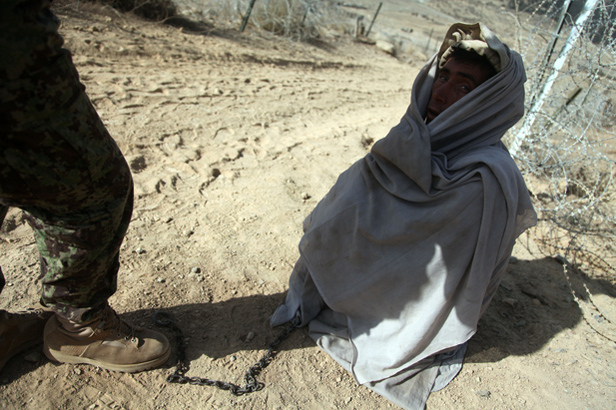
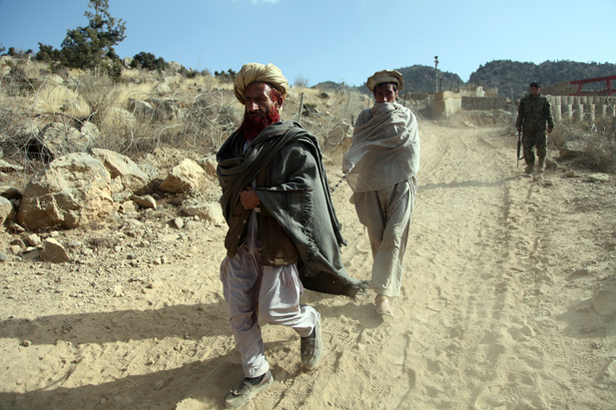
In the areas immediately over the border, the Taliban pretty much are the law. I suspect the father had hoped they would resolve a “family problem”, which back fired, leading him to turn to the American’s as if expecting something similar to their local forms of tribal arbitration. I also suspect there was an element of truth to both of their stories and that marijuana addiction was not the son’s only problem; perhaps in another place he may have been able to receive the care that he seemed to need. When I left Spera, the two men were still being detained by the Afghan soldiers in their adjoining compound.
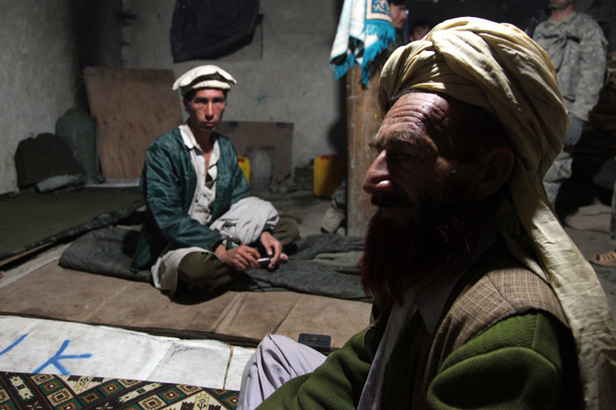 [Father and son in detention at the Afghan National Army outpost next to COP Spera]
[Father and son in detention at the Afghan National Army outpost next to COP Spera]
